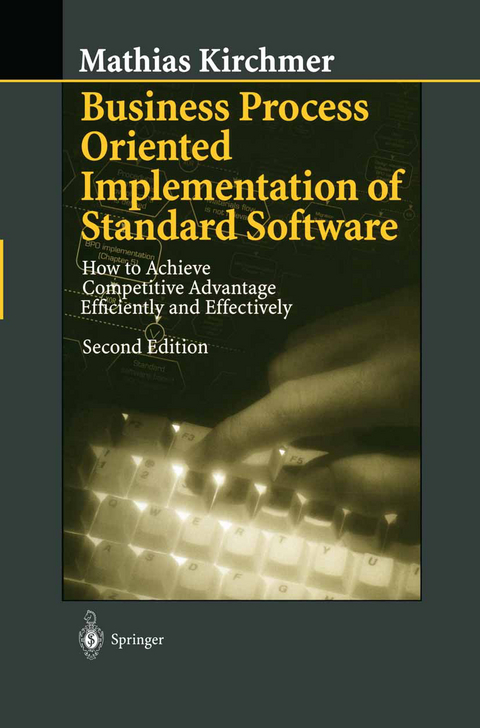
Business Process Oriented Implementation of Standard Software
Springer Berlin (Verlag)
978-3-540-65575-6 (ISBN)
1 Business Process Oriented Organizational Structures and Function Oriented Standard Software -Implications for the Implementation.- 1.1 Business Process Oriented Design of Organizational Structures.- 1.2 Function Oriented Design of Standard Software.- 1.3 Implications for the Implementation of Standard Software.- 1.4 Objective and Structure of this Work.- 2 Development of a Procedure Model for Business Process Oriented Implementation of Standard Software.- 2.1 Requirements for Implementing Standard Software.- 2.2 Existing Approaches for Implementing Standard Software.- 2.3 Developing a Procedure Model for Business Process Oriented Implementation.- 3 Strategy Based BPO Concept.- 3.1 Defining the Target System.- 3.2 Defining Business Processes.- 3.3 Detailing Individual Information System Views.- 3.4 Splitting Up Business Processes.- 3.5 Defining the Scope of the Standard Software Deployment.- 3.6 Determining the Implementation Strategy.- 4 Standard Software Based BPO Concept.- 4.1 Defining Consistent Business Terminology.- 4.2 Material Flow Related Supplement of the BPO Concept.- 4.3 Detailing the BPO Concept on the Transactional Level.- 4.4 Detailing the BPO Concept on the Screen Level.- 4.5 Defining a Migration Plan.- 5 BPO Implementation.- 5.1 Prime and Execute IT Measures.- 5.2 Prime and Execute Organizational Measures.- 5.3 Live Start of the Standard Software.- 5.4 Optimizing Business Processes in the Live Phase.- 6 Comprehensive Model of Business Process Oriented Implementation.- 6.1 Aggregating the Implementation Process Model.- 6.2 Fulfilling the Requirements for the Implementation.- 6.3 Outlook.- References.- Table of Figures.- Abbreviations.
| Erscheint lt. Verlag | 11.3.1999 |
|---|---|
| Zusatzinfo | XII, 236 p. |
| Verlagsort | Berlin |
| Sprache | englisch |
| Maße | 155 x 235 mm |
| Gewicht | 518 g |
| Themenwelt | Mathematik / Informatik ► Informatik ► Theorie / Studium |
| Informatik ► Weitere Themen ► Hardware | |
| Wirtschaft ► Betriebswirtschaft / Management | |
| Schlagworte | Anwendungssoftware • BPR • Business Process Reengineering (BPR) • Business Process Reengingeering (BPR) • ERP • Geschäftsprozesse • knowledge management • Kontinuierlicher Verbesserungsprozeß (KVP) • Reference Models • Referenzmodelle • Software • Standardsoftware • Standard Software • Supply Cha • Supply Chain Management (SCM) • Tools • Werkzeuge • Wissensmangement |
| ISBN-10 | 3-540-65575-1 / 3540655751 |
| ISBN-13 | 978-3-540-65575-6 / 9783540655756 |
| Zustand | Neuware |
| Informationen gemäß Produktsicherheitsverordnung (GPSR) | |
| Haben Sie eine Frage zum Produkt? |
aus dem Bereich


